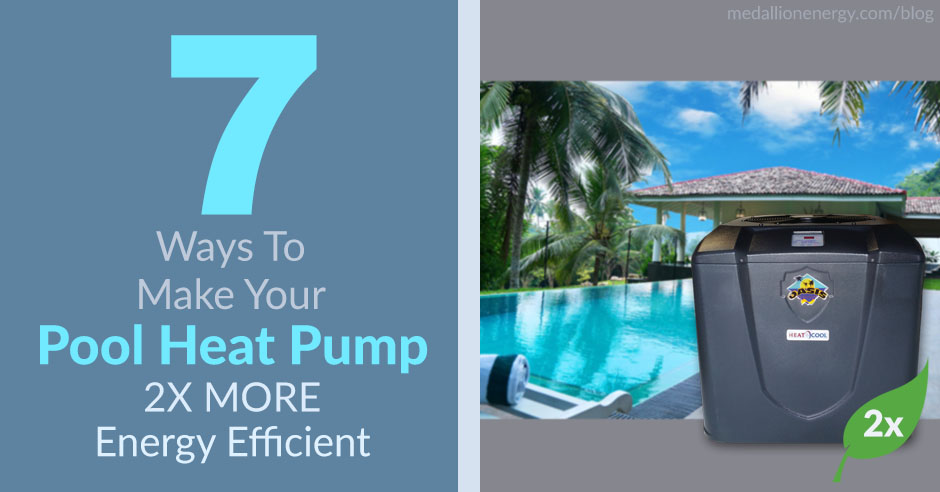Pool heat pumps stand as one of the most energy-efficient pool heating options available today. At about 1/3 the cost of gas heating, pool heat pumps allow pool owners to extend their pool season without breaking the bank. Which is great if you need a cheap way to heat your pool.
And if you own a pool heat pump, then you already know how great it is to have affordable, on-demand heat when you need it.
But what if we told you that there was a way to make your pool heat pump 2x more energy efficient?
While heat pump maintenance is the key to consistent performance, there are a few other hacks that can make your heater even more effective. In this post, we show 7 ways to make your pool heat pump more energy efficient.
As you know, better energy efficiency means lower swimming pool bills and a warmer pool. So let’s get started!
7 Ways To Make Your Pool Heat Pump 2x MORE Energy Efficient
Use a solar cover to improve your swimming pool’s heat retention
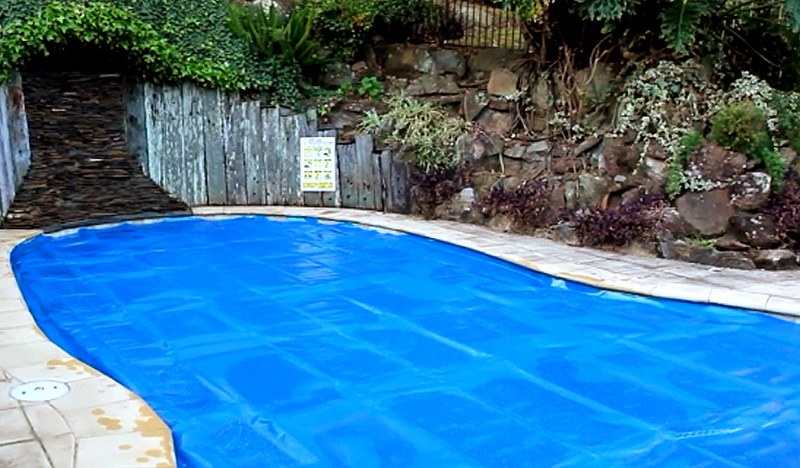


With a pool heating, warming up your water is never the issue — it’s KEEPING it warm. In order to maintain a constant water temperature, you have to keep your pool heater running. And if you’re like most pool owners, then you probably already doing that at least 8 hours a day.
But once you stop running your heater, your pool experiences a natural process of heat loss. With water circulation cut off, your pool releases heat from the surface. This cool down process is also sped up by factors like colder weather and windy storms.
Now, if your heating budget is limitless then this might not bother you much. But if you want to improve your swimming pool’s ability to retain heat, and reduce the amount of time you run your heater, there’s one change that will make a huge difference.
That change is using a solar cover.
Using a solar cover not only improves your pool’s heat retention but also reduces water loss. With a proper water level and better heat retention, you’ll notice your heating warm up your pool much sooner.
Related: How To Use a Solar Cover
Always keep the evaporator coil and vents clean
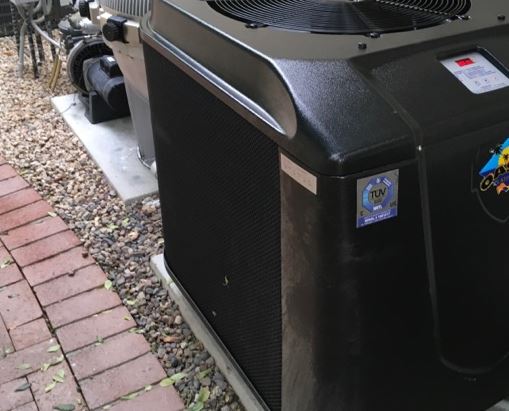


After a few months of use, parts inside of your pool heat pump will experience natural wear and tear. While this is all normal, some parts will get dirty in the process.
At first, the difference may be small. But a dirty evaporator coil can drastically reduce your heat pump’s ability to harvest heat, cutting it in half.
There are a few times when you should clean your evaporator coil:
- At the beginning of each pool season
- After a hurricane or major storm
- After a flood
By keeping your evaporator coil clean, you ensure that your pool heat pump can harvest heat as effectively as possible.
In the same light, the vents on the side of your pool heat pump, which cover the evaporator coil, should be kept clear to avoid reducing air flow. Keep a lookout for twigs and leaves, removing any debris that builds up.
When you’re ready to clean your evaporator coil, an annual heat pump service covers all your bases. It includes evaporator coil cleaning and additional maintenance and testing of other important parts.
Keep your pump running at a low speed when the pool heater is off
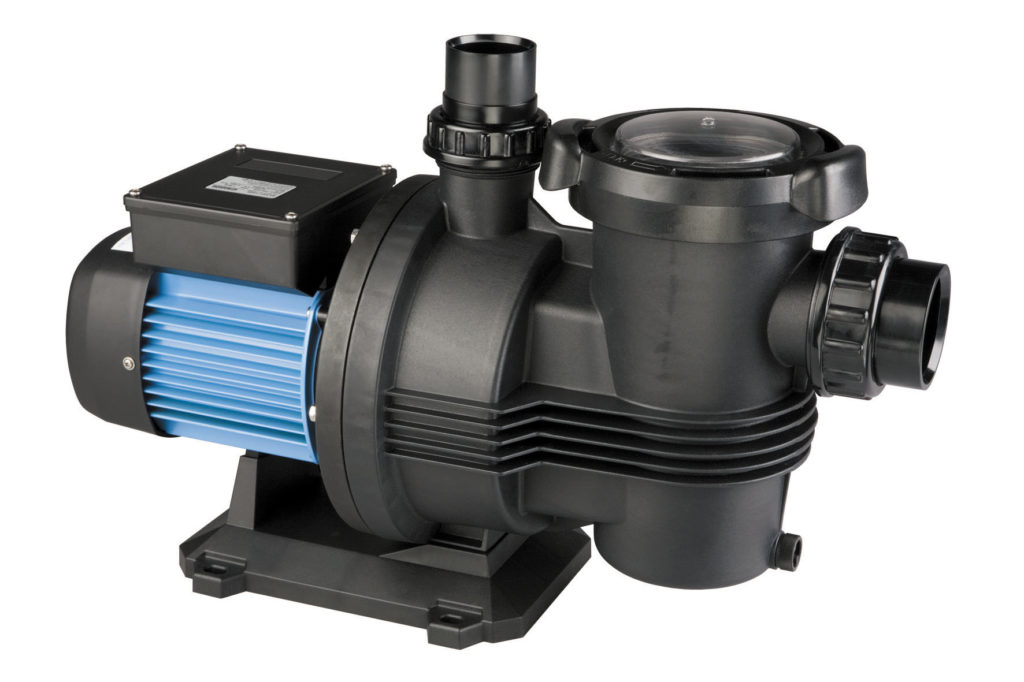


Even if you’re keeping your heater in good shape and using a solar cover, there’s still one small problem:
Some heat loss is still going to happen when you turn off your heater.
Naturally, the second the water in your pool stops circulating, it begins to cool down. While a solar cover can slow down this process, it won’t stop it.
So what do you do?
Keep the water circulating by running your pump at a low speed when the heater is off. Since running your pump at night (non-peak hours) is when it’s cheapest, this is a great strategy for pool owners who want to avoid reheating their pool each morning during colder weather.
By keeping the water in your pool circulating, you give it a smaller window for cooling down. And by controlling your pool temperature more effectively, you make your pool heat pump more energy efficient.
Related: Why You Should Use a Variable Speed Pump
Clean out all filters and baskets at least once a week
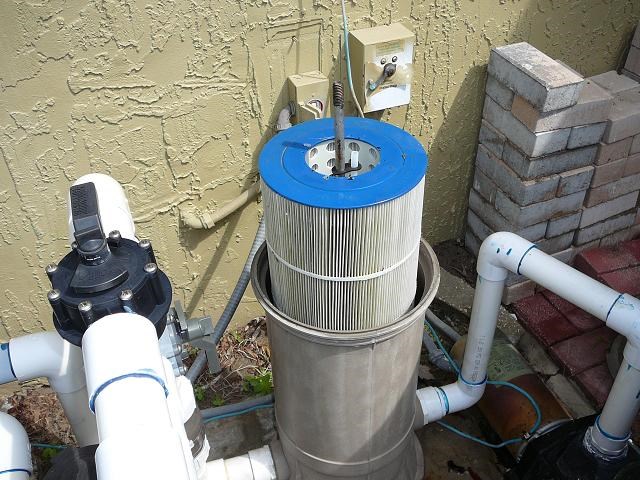


On the topic of circulation, how smoothly your pool water moves through the filter system matters. A lot.
Why?
Because the easier that water can move through your pool system, the faster and more efficient the heating process will be.
Which is why keeping your water circulation at 100% is a great move for improving your heat pump’s efficiency.
To keep your water circulating smoothly:
- Clean out your filter at least every other week
- Empty out the skimmer basket each week
- Empty out the pump basket each week
The easier that water can move through the system, the better your heat distribution.
Adjust your water temperature strategically
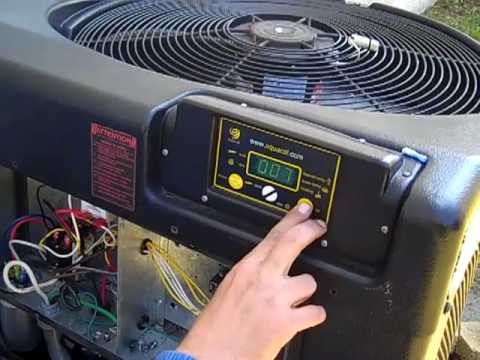


Did you know there’s a simple temperature adjustment you can start using right now that will save you money?
It has to do with the temperature you set your pool heat pump to when it’s idle.
While you swim, you may end up turning up the temperature as high as 83 degrees.
But what about when you’re not using the pool, or only going in for a quick dip?
By bringing your heater’s standby temperature down to 78 degrees, you can save up to 30% more each month in heating costs.
How’s that for improving your pool heat pump’s energy efficiency?
Let solar heating do the heavy lifting
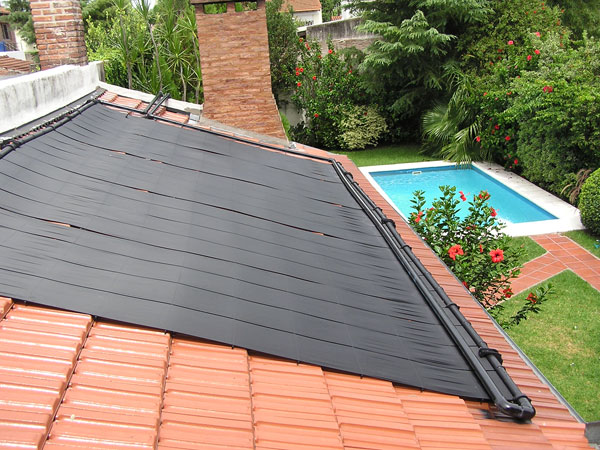


It may be weird to think that using two different types of pool heaters at once can save you money. But it really can.
Of course, it all depends on which two heaters you’re using.
If you’re using a pool heat pump and solar heater it’s easy as pie.
Since solar pool heaters only need a running filter pump to work, they cost much less to run than most heaters. This, of course, is offset by the fact that they only work well with constant direct sunlight.
Nonetheless, by using your solar heater on the sunny days, and reserving your heat pump for cold and cloudy ones, you can easily chop your heating bill in half.
Related: Pool Heat Pumps vs Solar Heaters: Which is best?
Use an automatic timer to make your heating cycles more accurate



Using all of the tips above will no doubt improve your heat pump’s energy efficiency.
But what happens if you aren’t around to run your pool heater, or turn on the pump?
Your pool cools down, a lot. Costing you extra in heating to warm it back up again.
But what can you do, aside from hiring a pool guy to do it for you?
You can instead enlist the help of an automatic timer.
It’s a fraction of the cost of a pool guy, twice as responsible, and won’t charge you for a filter cleaning they never did.
Here’s how they work: whenever your pool reaches a pre-set temperature, the timer kicks on and powers up your pump and heater.
So basically, it keeps the ship running for you while you’re away — keeping your water warm and comfortable for spontaneous swims.
Related: 11 Simple Ways To Automate Pool Maintenance
BONUS: Ensure that you size your pool heat pump correctly
If you haven’t purchased your pool heat pump yet, or are thinking about upgrading, this tip is for you.
Although it might not seem important, sizing your pool heat pump correctly makes a difference. And finding the right size has everything to do with where you live, and the size of your pool.
If your pool is too big, and your heater is too small, then you’ll have to run it way more than normal. Nearly twice as much then you would with a larger unit.
That’s why sizing your pool heat pump correctly from the start is the best heating decision you can make.
Closing thoughts: Making your pool heat pump more energy efficient
The secret to making your pool heat pump more energy efficient lies in improving your pool’s ability to retain and generate heat. The more effectively you can lock in heat, the better your pool heater will work, and the less you’ll have to run it.
Have a pool heat pump that could use a performance tune-up? Why not schedule your annual service call today?
If you liked this post, you might also like:
- 21 Pool Care Hacks That Make Pool Maintenance Easier
- 7 Ways To Extend Your Pool Season By Up To 6 Months
- 20 Benefits of Owning a Swimming Pool

